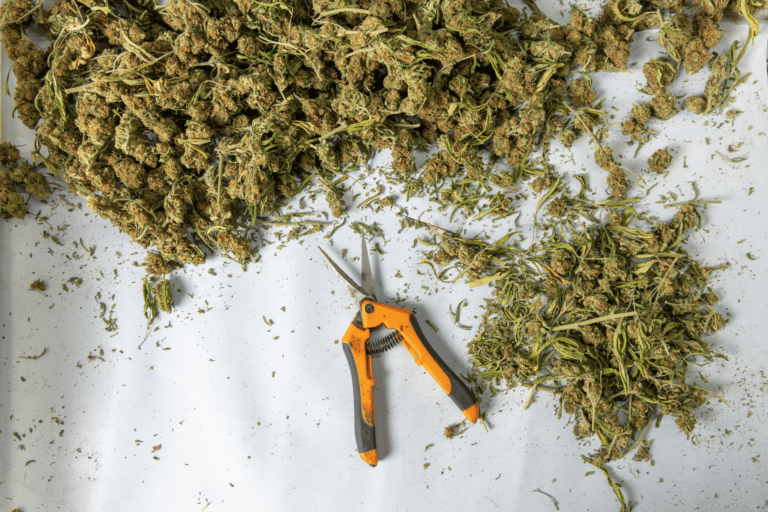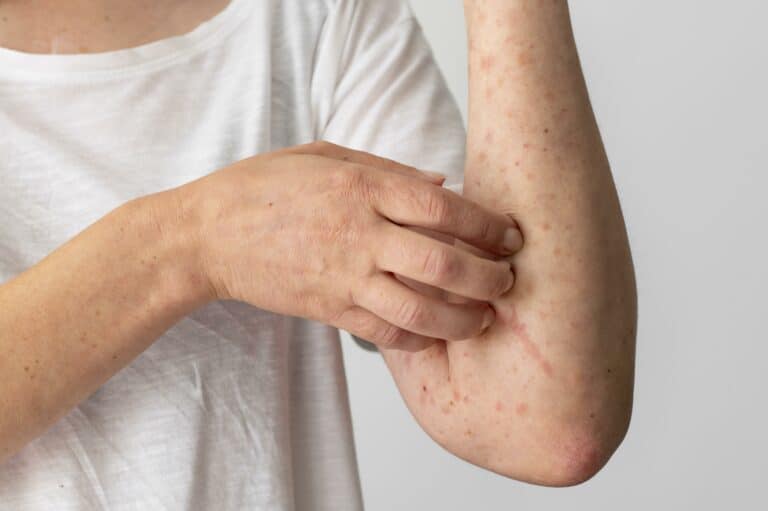Menopause
Would medical marijuana work as a treatment option for menopause? Let’s find out together below.
What is Menopause?
Menopause occurs when a woman goes twelve consecutive months without a menstrual cycle. The period right before menopause is called perimenopause and is when many people assigned female at birth (AFAB) begin to transition to menopause. They may notice shifts in menstrual patterns or experience symptoms like hot flashes.
What are the symptoms?
Many female body parts utilize estrogen; as it decreases, there could be various symptoms. Many experience mild symptoms that are treatable by lifestyle changes, such as avoiding caffeine or carrying a hand-held fan. Symptoms can be more severe for others and vary worldwide by race and ethnicity.
Here are the most common menopausal symptoms:
- Period Changes might be the first thing that is noticed. Periods may no longer be regular; they could be shorter, longer, or with more or less blood flow.
- Hot flashes can last many years after menopause and are related to changing estrogen levels. A hot flash is a sudden feeling of heat in the upper part of the body where the face and neck may become flushed. Red blotches may appear on the chest, back, and arms, followed by heavy sweating and shivering. Most hot flashes last between one and ten minutes and can happen several times hourly, a few times a day, or a week.
- Bladder control loss is called incontinence. There may be a sudden urge to urinate, or urine may leak during exercise, sneezing, coughing, or laughing.
- Sleep Issues. Some women start having trouble falling asleep and staying asleep all night. Night sweats can also wake you up.
- Sexuality. The vagina may become drier, making sex uncomfortable without lubrication. Feelings about sex may also shift. For example, some women feel less interested, freer, or sexier because they can no longer become pregnant.
- Mood changes. It’s possible that stress, family changes, depression, or fatigue could cause menopausal mood changes.
- Noticeable Body Shifts. The waist could become more prominent, causing muscle loss, fat gain, thinner skin, memory problems, aches, and stiffness.
Three Stages of Menopause
The natural menopause process is permanent and gradual. It occurs in three stages:
- Perimenopause can begin eight to ten years before menopause when your ovaries start to produce less estrogen. It typically begins in the mid to late 40s. The decrease in estrogen accelerates in the last one to two years of perimenopause before your ovaries stop releasing eggs. Many people experience menopause symptoms but still have menstrual cycles and can get pregnant.
- Menopause is when you no longer have menstrual periods. Your ovaries have stopped releasing eggs and producing most estrogen. A doctor can diagnose menopause when the patient has gone without a menstrual period for twelve months.
- Postmenopause is when a person hasn’t had a period for a full year. Menopausal symptoms, such as hot flashes, may get better in some, but many have had menopausal symptoms for years. As a result of a lower estrogen level, people in this stage are at an increased risk for certain health conditions, such as osteoporosis and heart disease.
Causes of Menopause
The average age for menopause in the United States is approximately fifty-one, but the transition to menopause typically begins in your mid-40s. Natural menopause is a normal part of aging. Menopause occurs after a whole year without menstrual bleeding without assistance from hormonal birth control, radiation therapy, or surgical removal of the ovaries.
The reproductive cycle begins to slow down with age and prepares to stop. As menopause gets closer, the ovaries make less of a hormone called estrogen. When this decrease occurs, your menstrual cycle can become irregular and eventually cease altogether. Physical changes can also happen as your body adapts to changing levels of hormones. The symptoms experienced during each stage of menopause (perimenopause, menopause, and postmenopause) are part of the body’s adjustment to these changes.
Treatments for Menopause
In many cases, menopause happens naturally and may not need any treatment. When discussing treatment for menopause with your doctor, it’s about treating the symptoms of menopause that affect your daily life. There are various hormonal and non-hormonal types of treatments for the symptoms of menopause. Here, we’ll learn about a few different treatment options for Menopause.
Hormonal
There are two types of hormone therapy:
- Estrogen therapy (ET): The doctor prescribes estrogen at a low dose in this treatment. Estrogen comes in various forms, such as a topical patch, pill, cream, vaginal ring, gel, or spray. Estrogen therapy isn’t a good treatment option for those with a uterus.
- Estrogen Progesterone/Progestin Hormone Therapy (EPT) treatment is called combination therapy because it uses doses of estrogen and progesterone. Progesterone is available naturally or synthetically. It’s hormone therapy for those with a uterus.
Non-hormonal
Nonhormonal treatments are often good options for patients with medical conditions or who have been treated for breast cancer.
The primary nonhormonal therapies include:
- Diet changes
- Avoiding hot flash triggers
- Exercise
- Support Groups
- Prescription Drugs
Can Medical Marijuana Help?
Menopause symptoms are often irritating and can include significant shifts in mood, night sweats, hot flashes, insomnia, vaginal dryness, and irregular menstrual cycles. There are many conventional and alternative treatments for the symptoms, but medical marijuana can ease many of them.
A functioning endocannabinoid system may lead to various health conditions, and menopause disrupts this system. There are cannabinoid receptors throughout the female reproductive system, so CBD oil may reduce some of the menopausal symptoms.
Several cannabis products, including tinctures, bath salts, suppositories, and personal lubricants, are being marketed to menopausal consumers. With more time, studies, and consumer reviews, medical cannabis will likely continue as an alternative menopause therapy, making millions of women more comfortable.
Last Updated: June 14, 2024
Get Your Medical Card
Connect with a licensed physician online in minutes
Table of Contents
Keep Reading
-
Exploring The Benefits Of Topicals For Cannabis Pain Relief
Experience the incredible pain-relieving benefits of cannabis topicals! Find out why topicals are a game-changer for pain relief and explore their effectiveness today. Click here to learn more about using topicals for pain relief!
-
How Can I Use Leftover Leaves and Stems?
Don’t throw away all that marijuana trimming! Learn how to use your leftover leaves and stems to create delicious edibles, make homemade extracts, and more.
-
Can You Be Allergic to Marijuana?
Can You Be Allergic to Marijuana? Many people are curious about whether or not they can be allergic to marijuana.



